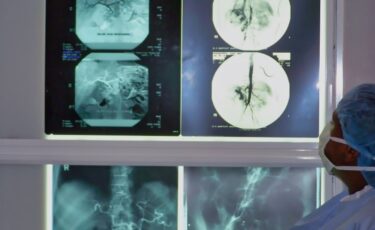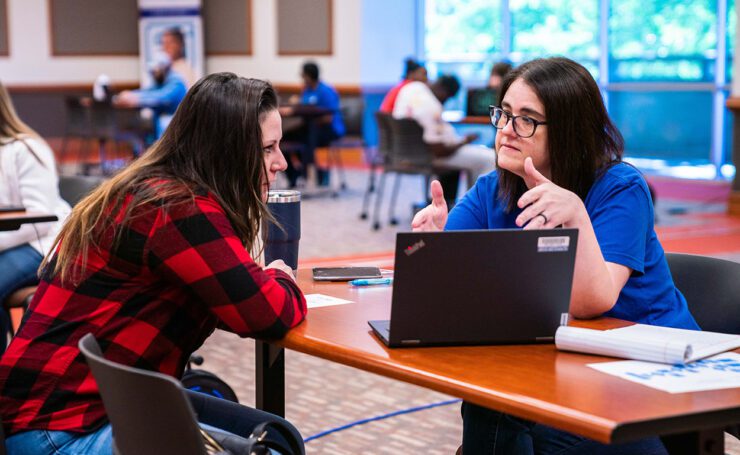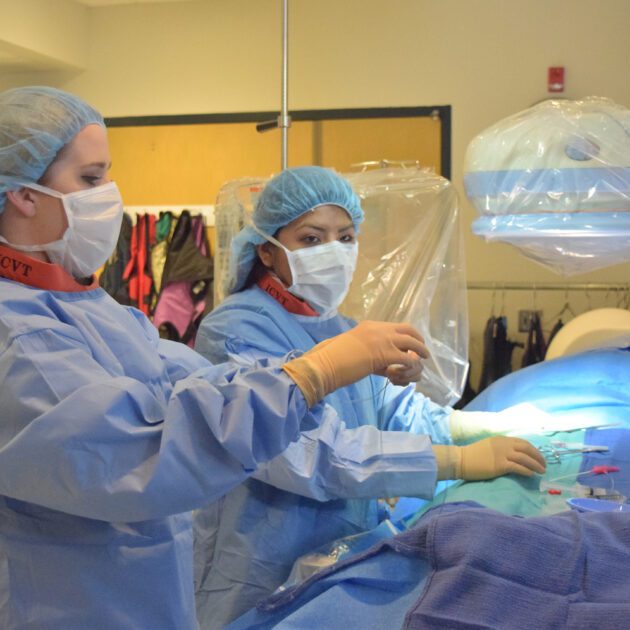Why study interventional cardiac and vascular technology?
Cardiac and vascular interventional technology is a crucial field that utilizes specialized equipment to diagnose and treat cardiovascular conditions. Technologists work alongside healthcare professionals, performing tests and assisting with interventional procedures. This field requires specialized training and offers certification options, with employment opportunities in major medical centers.
.
See our Minimum Admission Requirements for the ICVT Degree program here.
See our Minimum Admission Requirements for the ICVT Advanced Placement (AP) program here.
Degrees & Certificates

Interventional Cardiac and Vascular Technology
Associate Degree in Applied Science
Time to Complete:
Two years
Schedule:
Day classes
An associate degree in Interventional Cardiac and Vascular Technology prepares students to work in a patient-oriented critical care environment. The curriculum provides advanced understanding of human vascular systems, while clinical courses provide the experience needed to become skilled specialists in the areas of invasive diagnostic and interventional procedures including, cardiac catheterization, electrophysiology, interventional radiology, and vascular interventional surgery.

Interventional Cardiac and Vascular Technology – Vascular
Certificate
Time to Complete:
One to two semesters
Schedule:
Online classes
Applicants must be employed in an active Interventional Peripheral Vascular/Endovascular Lab and have graduated from an approved accredited program with an Associate Degree or higher in Radiography.
$75,000
Average annual salary
14 %
Job growth
117
Job openings
Career Tracks
- Cardiac Cath Lab
- Electrophysiology Lab
- Interventional Radiology
- Endovascular Surgery
- Industry Representative
Accreditation and Program information
- The Interventional Cardiac and Vascular Technology (ICVT) Program is accredited by the Commission on Accreditation of Allied Health Programs (www.caahep.org ) upon the recommendation of the Joint Review Committee on Education in Cardiovascular Technology (www.jrccvt.org )
- Joint Review Committee on Educational Programs in Cardiovascular Technology (JRCCVT) 1449 Hill Street Whitinsville, MA 01588
-
P: 978.456.5594
The Commission on Accreditation of Allied Health Education Programs
9355 – 113th St. N, #7709
Seminole, FL 33775
P: 727-210-2350
E: mail@caahep.org
Program Goals and Student Learning Outcomes
- To prepare competent entry-level cardiovascular technologists in the cognitive (knowledge), psychomotor (skills), and affective (behavior) learning domains for invasive cardiovascular technology.
- To provide quality technical training, as supported by related study needed to develop competent, professional entry-level Vascular and/or Cardiovascular Interventional Specialist who will continue to learn.
- To provide the necessary education and experiences needed to challenge and pass the Registered Cardiovascular and Vascular Interventional exams offered by Cardiovascular Credentialing
International (CCI). -
- The Interventional Cardiac and Vascular Technology curriculum engages students in various educational experiences including classroom, laboratory, and clinical settings. Students are taught to use specialized equipment to aid in the visualization vascular structures and to assist physicians in diagnostic and interventional procedures.
- Theory courses provide an advanced level understanding of human vascular systems, while clinical courses provide the experience needed to become entry-level specialists in the areas of invasive diagnostic and interventional procedures. Through academic and clinical studies, the student is prepared to provide quality patient care and professional communication skills while performing scheduled and emergency angiographic studies utilizing sterile technique, advanced radiographic and specialty equipment, and radiation protection techniques.
- Program graduates may be eligible to sit for the Registered Cardiovascular Invasive Specialist (RCIS) exam, given by Cardiovascular Credentialing International (CCI). Invasive Specialists may find employment in medical facilities where cardiovascular interventional imaging procedures are performed including: cardiac catheterization, electrophysiology, interventional radiology, and endovascular surgery.
-
| YEAR GRADUATING | RETENTION RATE | RCIS PASS RATE | POSITIVE JOB PLACEMENT |
| 2020 | 60% | 100% | 100% |
| 2021 | 57% | 100% | 100% |
| 2022 | 40% | 100% | 100% |
| 2023 | 83% | 100% | 100% |
- Cone Health Systems, Greensboro, North Carolina
- Duke Medical Center, Durham, North Carolina
- Forsyth Medical Center, Winston-Salem, North Carolina
- High Point Medical Center, High Point, North Carolina
- Wake Forest Baptist Medical Center, Winston-Salem, North Carolina
- The following is a semester-by-semester program cost analysis. The prospective student should keep in mind that these costs may vary and some represent “typical averages”. The average is also based on full-time in-state student status and does not include costs associated with general education and related courses. Course texts/material costs subject to change without notice.
- Click on the Link to View Program Costs PDF
- Marti K. Feathers-Magee, M.Ed., RT(R)(CV), RCIS, CCIR
ICVT Program Director - LeAnn H. Scruggs, BS, RT(R)(CI)(BD), RCIS
ICVT Clinical Education Coordinator - Jim Johnston, BSRN, RCIS
Didactic Instructor - Misty Hayes
Imaging Secretary

Get the education you deserve without spending your days worrying about how to afford it. Our financial aid team can help you chart a path to paying for college, including through debt-free grants and scholarships.

The Forsyth Tech Cares program supports students so they can succeed, including access to financial assistance, health services, and confidential counseling.
Visit us today!
Forsyth Tech is located at:
2100 Silas Creek Parkway,
Winston-Salem, NC 27103
